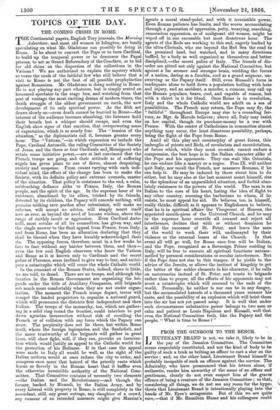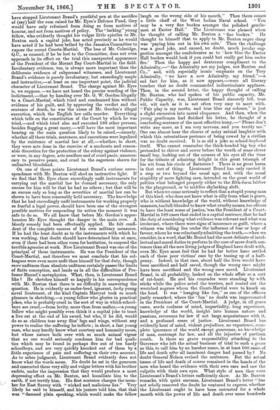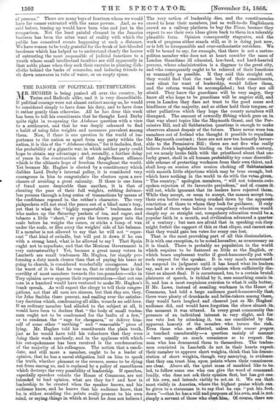FROM THE GUNROOM TO THE BENCH. •
LIEUTENANT BRAND is not, we take it, likely to be in the pay of the Jamaica Committee. The Committee seems respectably constituted, and not the kind of body to be guilty of such a trick as bribing an officer to cast a slur on the service • and, on the other hand, Lieutenant Brand himself is probably incapable of such an offence against the service. The Admiralty, who have pronounced that his letters alone, if authentic, render him unworthy of the name of an officer and gentleman, clearly do not even suspect him of the graver offence of being a creature of the Jamaica Committee ; so that, considering all things, we do not see any room for the hypoz. thesis that Lieutenant Brand is intentionally playing into the hands of Mr. Eyre's antagonists. But of this we are quite sure,—that if Mr. Hamilton Hume and his colleagues could
have stopped Lieutenant Brand's youthful pen at the sacrifice of (say) half the sum raised for Mr. Eyre's Defence Fund, they would have only refrained from doing so from motives of honour, and not from motives of policy. The "larking" young
-fellow, who evidently thought his vulgar little epistles to Mr. Buxton such a capital joke, has acted precisely as he would have acted if he had been bribed by the Jamaica Committee to expose the recent Courts-Martial. The loss of Mr. Coleridge, Q.C., as counsel, if he be lost to the Committee, does not even
approach in its effect on the trial this unexpected appearance of the President of the Morant Bay Court-Martial in the field. Involuntary evidence, too, is always more important than the deliberate evidence of subpoenaed witnesses, and Lieutenant Brand's evidence is purely involuntary, but exceedingly ample and instructive at least on one important point, the judicial character of Lieutenant Brand. The charge against Mr. Eyre is, we suppose, —we have not heard the precise wording of the indictment,—that by handing over Mr. G. W. Gordon illegally to a Court-Martial, which tried and condemned him without evidence of his guilt, and by approving the verdict and the sentence of death, he was the cause of Mr. Gordon's illegal 'execution, which the English law calls murder. Everything which tells on the constitution of the Court by which he was tried,—and which tried also and executed 188 other persons, besides flogging a great many,—will have the most important bearing on the main question likely to be raised,—namely, whether all these trials, sentences, and executions were legalized by the existence of martial law at all,—whether, in short, they were acts done in the exercise of a moderate and reason- able discretion for the protection of the colony against violence, or were, in any degree, acts needless and of cruel panic, unneces- sary to preserve peace, and cruel in the eagerness shown for amlimited bloodshed.
On one of these points Lieutenant Brand's curious corre- spondence with Mr. Buxton will shed an instructive light. If we find that Mr. Eyre chose exceedingly unfit instruments for -carrying out the martial law he deemed necessary, the only excuse for him will be that he had no others ; but that will be an excuse only so long as the severities of martial law can be shown to have been reasonably held necessary. The knowledge that he had exceedingly unfit instruments for working properly so fearful a legal power, should have been one of the strongest possible motives for suspending its action the moment it was safe to do so. We all know that before Mr. Gordon's appre- hension Mr. Eyre thought the danger in the main over. A Moody remedy had been effectually applied. He felt confi- dent of the complete success of his own military measures.
If he had the least doubt as to the instruments with which he was working, that doubt should have determined him at once, even if there had been other room for hesitation, to suspend the terrible agencies at work. Now Lieutenant Brand was one of the principal of these instruments. He was the President of the Court-Martial, and therefore we must conclude that his col- leagues were even more unfit than himself for that duty, though more unfitness than absolute unfitness certainly passes the limits of finite conception, and lands us in all the difficulties of Pro- fessor Mansel's metaphysics. What, then, is Lieutenant Brand like ? He sketches himself so happily in his correspondence with Mr. Buxton that there is no difficulty in answering the question. He is evidently an under-bred, ignorant, larky young naval lieutenant, of the kind Captain Marryat took so much pleasure in sketching,—a young fellow who glories in practical jokes, who is probably cruel in the sort of way in which school- boys are cruel,—from levity, more than from malice,—a young fellow who might possibly even think it a capital joke to toast a live rat at the end of his sword, but who, if he did, would do so as children tear away flies' legs and wings, without any power to realize the suffering he inflicts ; in short, a fast young man, who may hardly know what courtesy and humanity mean, but whose nature boils over with so much animal vigour that no one would seriously condemn him for bad quali- ties which may be found in perhaps five out of ten hardy schoolboys, and are very quickly knocked out of them by a little experience of pain and suffering on their own account.
As to sober judgment, Lieutenant Brand evidently does not know what the words mean. No doubt he sat in the gunroom and concocted these very silly and vulgar letters with his brother cadets, under the impression that they would produce a most depressing effect on -Mr. Buxton, and humiliate him to the .earth, if not terrify him. His first sentence charges the mem- ber for East Surrey with " wicked and malicious lies." Very likely he said to himself, and his juniors told him, that that was "damned plain speaking, which would make the fellow
laugh on the wrong side of his mouth." Then there comes a little chaff of the West Indian Naval school. "You may be a very fine buckra amongst the polished gentle- men at Exeter Hall." The Lieutenant was pleased when he thought of calling Mr. Buxton a " fine buckra." He thought to himself that to apply to Mr. Buxton negro slang was 'paying him out in his own coin.' Then the challenge was a good joke, and caused, no doubt, much jocular sug- gestion amongst the confederates as to how blue the Exeter Aall buckra would look if you could but really get him under fire.' Then the happy and dexterous compliment to the Admiralty,—" the Admiralty are my judges, not Buxton and Co.," and, with especially ironic ' emphasis on the Tory Admiralty, " we have a new Admiralty, my friend,"—a sad fact for him, as it now appears,—were all literary touches that no doubt commanded indiscriminate applause. Then, in the second letter, the happy thought of calling Mr. Buxton, who had spoken of his public capacity, Mr. Public Capacity, was, Lieutenant Brand sincerely felt, true wit, wit such as it is not often very easy to meet with. " Fair play is my motto, and true blue my colours," is just a slight excursion into moral eloquence. And then, when the young gentleman had finished his letter, he thought of a concluding sentence of the most effective irony,—" Please don't write any more, as I am very nervous, and you terrify me." One can almost hear the chorus of noisy animal laughter with which this ostentatious pretence of being cowed by a civilian was no doubt received. It is as old a joke as school-boyhood itself. Who cannot remember the thick-headed big boy who pretended to shiver and cower before the wrath of some clever small boy, looking out of the corners of his eyes all the time for the tribute of admiring delight in this great triumph of his wit from his circle of flatterers ? There is no great harm in that sort of thing. Lieutenant Brand has only carried it a step or two beyond the usual age, and, with the usual stupidity of mere fighting men, intruded on the great world of politics what belonged properly either to the fifth-form lubber in the playground, or to middies skylarking aloft.
But when we come seriously to reflect that a stupid young man of this kind, who does not know what is silly from what is grave, who is without knowledge of the world, without knowledge of manners, too full-blooded to know what cruelty means, too obtuse to have the least sense of justice,"was the President of a Court- Martial in 189 cases that ended in a capital sentence, that he had the duty of considering what evidence was relevant and what was irrelevant, where there were signs of innocence or guilt, where a witness was telling lies under the influence of fear or hope of favour, where he was reluctantly admitting the truth,—when we consider, in a word, that Mr. Brand had the most delicate of intel- lectualand moral duties to perform in the case of more death sen- tences than all the now living judges of England have dealt with, even Mr. Eyre must feel that he had far better have settled each of these poor victims' case by the tossing up of a half- penny. Indeed, in that case, about half the lives would have been sacrificed and half saved, though the wrong ones might have been sacrificed and the wrong ones saved. Lieutenant Brand, in all probability, looked on the whole affair as a sort of rat-hunt. He and his comrades were standing by with sticks while the police acted the terriers, and routed out the wretched negroes whom the Court-Martial were to knock on the head. It was "hanging like fun," as one of the officers justly remarked, where the fun ' no doubt was impersonated in the President of the Court-Martial. A judge, in all grave cases, needs coolness of mind, impartiality, long experience, knowledge of the world, insight into human nature and passions, reverence for law if not large acquaintance with it, and a profound sense of justice. Lieutenant Brand has evidently heat of mind, violent prejudices, no experience, com- plete ignorance of the world etcept gunrooms, no knowledge of man, contempt for law, and all the injustice of partizan youth. Is there no grave responsibility attaching to the Governor who left the actual business of trial to such a goose as this, to call him by no harsher name, in at least 100 cases of life and death after all imminent danger had passed by ? No doubt General Nelson revised the sentences. But the actual issues of life and death of course remained in the hands of the • men who heard the evidence with their own ears and saw the culprits with their own eyes. What style of men they were Lieutenant's Brand's letters sufficiently show. As Mr. Buxton remarks, with quiet sarcasm, Lieutenant Brand's letter " has not wholly removed the doubt he ventured to express, whether the Lieutenant ought to have been entrusted for a whole month with the power of life and death over some hundreds
of persons." There are many boys of fourteen whom we would have far sooner entrusted with the same powers. And, as we said before, tossing up would have been wise and just in the comparison, Not the least painful element in the Jamaica business has, been the utter want of reality with which the public has conceived events happening at such a distance. We have reason tole truly grateful for the freak of hot-blooded insolence which has helped us to understand clearly the horror of entrusting the most responsible of judicial functions to a youth whose small intellectual faculties are still appazently, that noble phase when they seek their exercise in pinning dish- cloths behind the backs of comrades, and inducing friends to sit down ,unawares in tubs of water, or on empty space.
































 Previous page
Previous page